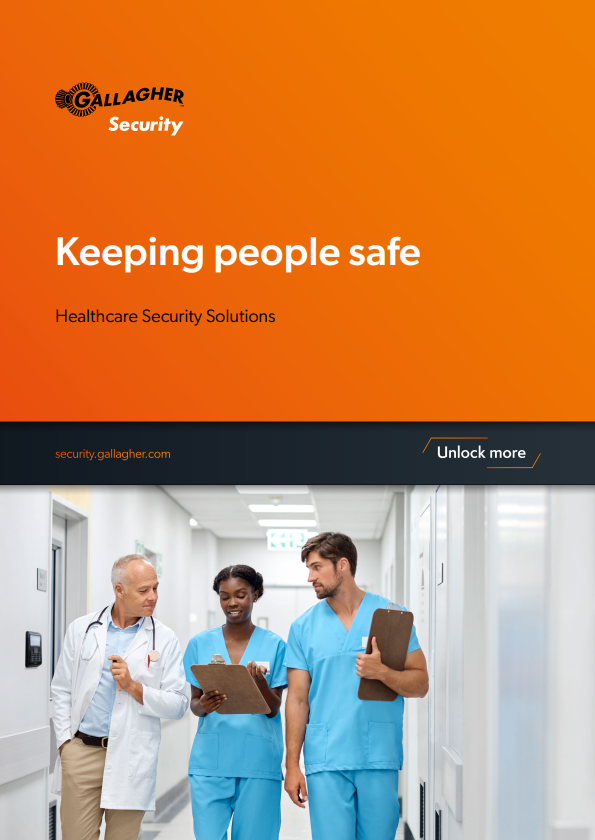
Key Takeaways:
- Key challenges for hospitals include data security, physical security, regulatory compliance, infection control, and budget constraints.
- Access control systems for hospitals can restrict who is authorized to access specific areas, resources, and information.
- These systems offer specific features to protect patient data with MFA and provide comprehensive auditing and monitoring for accountability.
- Gallagher's Command Centre is an integrated, central platform, unifying physical access, alarms, video, and visitor management across hospitals.
Hospitals are uniquely complex places. On the one hand, they're a space for health and healing, providing access and support to some of the most vulnerable people in our community. On the other hand, they're increasingly required to be a fortress of security, shielding patients and their personal information from rapidly growing threats.
This paradox is a daily challenge for hospital administrators and security managers. This article serves as your strategic guide, outlining the essential role of hospital access control systems in not just mitigating threats, but in actively fortifying patient safety, safeguarding sensitive data, and ultimately, creating an environment where both patients and hospitals can thrive.
Download our Healthcare Security Solutions Brochure
5 Key Security Challenges in Healthcare Environments
It's safe to say that hospitals are under unprecedented pressure, finding themselves on the front line of an escalating threat landscape. Here are the key challenges that administrators and security managers currently face.
- Data Security: Protecting sensitive patient records and confidential operational data from cyber threats, unauthorized access, and breaches.
- Physical Security: Safeguarding patients, staff, visitors, and valuable assets within a secure yet accessible environment.
- Regulatory Compliance: Adhering to strict healthcare regulations (like HIPAA, GDPR, or local standards) regarding data privacy, reporting and access control for hospitals.
- Infection Control: Minimizing the risk of pathogen transmission within clinical areas, which can be exacerbated by contact-based access methods.
- Budget Constraints: Managing security and operational needs within tight financial constraints, demanding solutions that offer clear efficiency gains and ROI.
How Hospital Access Control Systems Protect Patients & Staff
Recognizing this need for both physical and digital protection, hospital access control systems represent a transformative opportunity for hospitals to fortify security on all fronts.
Here are the key features of healthcare security systems and why they matter.
- Restrict Unauthorized Access: Limits physical entry to sensitive hospital areas like operating rooms and pharmacies using methods such as RFID, smart cards, biometrics, and mobile credentials, ensuring only authorized personnel gain access.
- Protect Patient Data: Safeguards sensitive digital records through robust digital controls, including multi-factor authentication and strong password policies, ensuring only approved hospital staff can view or modify them.
- Comprehensive Audit & Monitoring: Maintains detailed, tamper-proof logs of all physical and digital access attempts within the hospital system, which is crucial for accountability, compliance, and detecting suspicious activity.
- Emergency Preparedness & Safety: Enables rapid responses during threats, such as swift hospital-wide lockdowns or securing specific wings, often integrating with alarms and sensors for automated safety measures.
- Secure Zone Management: Provides precise and granular control over highly sensitive areas within the hospital, including maternity wards, pediatric units, oncology labs, and intensive care units, to ensure tailored security.
3 Ways to Enhance Data Protection and Compliance
Hospital administrators face increasing pressure to balance high security with financial viability and profitability. While this may seem like an impossible demand, hospital access control systems directly address the challenge using this 3-part approach.
- Streamlining Operations: Access control for hospitals automates entry, monitors visitors, and manages credentials for staff and contractors. This drastically cuts administrative load, freeing hospital personnel to focus on core healthcare.
- ROI & Risk Mitigation: By restricting unauthorized access and protecting patient data, healthcare security systems can prevent costly incidents. This includes averting severe fines (e.g., HIPAA, GDPR), litigation, and reputation damage from breaches or theft, proactively safeguarding the hospital's financial health.
- Accountability & Insights: Comprehensive audit and monitoring provide detailed, tamper-proof logs of all physical and digital access attempts. This granular level of tracking is invaluable for accountability, compliance, swift incident investigation, and identifying workflow improvements.
The Role of Mobile Credentials and Contactless Access
In busy hospital environments, maintaining stringent infection control is essential, but traditional access methods often require physical contact, creating potential contamination. Plus, managing secure access for temporary staff, visiting specialists, and contractors can be an extra challenge.
Using mobile credentials and contactless access significantly reduces surface contact at entry points, helping to create sterile environments and strong infection control measures. This level of access control for hospitals also provides an efficient and secure way to grant access to temporary staff, streamlining entry without compromising security.
Gallagher's Command Centre: The Integrated Solution for Secure Hospitals
Drawing on 35 years of in-depth industry experience, Gallagher's Command Centre delivers an integrated healthcare security system designed with hospital administrators and security managers in mind. Here's how this central, unifying platform balances robust security with operational efficiency and ROI to deliver tangible value.
- Centralized Security: Command Centre unifies physical access control, alarms, real-time monitoring, video, and visitor management across single or multiple hospital campuses, streamlining operations.
- Open Architecture & Integration: Seamlessly connects with existing hospital systems like HR, patient management, and building platforms (e.g., nurse call), enhancing interoperability.
- Dynamic RBA & Zone Control: Precisely restricts access to sensitive areas (e.g., operating rooms, maternity wards) based on roles, enabling tailored security.
- Robust Reporting & Compliance: Easily generates reports for HIPAA, GDPR, and other healthcare regulations, streamlining audits.
- Cybersecurity & Data Protection: Robust measures protect sensitive data like EHRs.
- Incident Response & Emergency Preparedness: Enables rapid lockdowns and incident resolution with real-time alerts.
- Offline Capabilities & Scalability: Ensures uninterrupted security during outages and adapts to growing facility needs.
- Secure Mobile Credentials: Allows authorized staff to use their smartphones for entry, reducing the need for physical contact with surfaces and supporting infection control measures in clinical environments.
Command Centre transforms security into an asset, boosting productivity, ensuring seamless operations, and supporting long-term growth for hospitals.
Case Study: Waikato District Health Board
Serving nearly 400,000 people across a vast region, Waikato District Health Board (Waikato DHB) faced complex security demands, from safeguarding staff and patients to securing high-risk medication stores and streamlining contractor access. They needed a unified solution that could provide granular control for both high and low-security zones, alongside robust auditing capabilities for strict compliance.
Gallagher's Command Centre provided a comprehensive solution. It introduced a single access-card system for instant permission updates and streamlined car park management. For critical areas, the system enabled rapid lockdowns, isolating sections as needed. Enhanced safety features included the Command Centre Mobile application, which delivers duress notifications, and Electronic Tag Boards for efficient contractor sign-on/off, ensuring health and safety compliance.
The implementation delivered significant business value. Staff gained confidence with seamless access, while the single-card system reduced risks associated with keys. Detailed reporting capabilities now meet all comprehensive auditing requirements, saving substantial time and cost. Waikato DHB's positive experience led them to develop a new 'Security Ward Standard,' drastically cutting documentation time and approvals. With a Software Maintenance Agreement, Gallagher solutions ensures Waikato DHB is future-proofed for whatever lies ahead.
Expert Insight: Gallagher's Approach to Healthcare Security
At Gallagher, we understand that security in healthcare facilities presents a unique challenge, demanding solutions that go beyond traditional protection. It's about securing highly sensitive environments while simultaneously enabling seamless, efficient operations.
"Access control is integral to maintaining a secure environment in healthcare facilities," notes Neil Jarvis, Sales Manager for Victoria and Tasmania. "It not only safeguards sensitive areas and data but also ensures that healthcare professionals can operate efficiently and without interruption." This highlights Gallagher's recognition that security must actively support, not hinder, the vital work of caregivers.
Adding to this, Pedro De Jesus, Sales Manager for Queensland and Papua New Guinea, emphasizes the nature of these settings: "Hospitals are unique environments where physical and digital security intersect. Robust access control ensures that only the right individuals have access to the right areas at the right time."
This combined insight forms the foundation of Gallagher's approach: a commitment to providing integrated hospital access control that precisely manages the flow of people and information, ensuring optimal security and operations in these critical environments.
Ready for a Smarter Healthcare Security System?
At a time when healthcare security systems must seamlessly integrate with operational efficiency and profitability, hospital access control is no longer an option, but a necessity. As we've seen, solutions that enhance patient safety, secure sensitive hospital data, and simplify complex regulatory compliance are critical.
Gallagher's Command Centre provides this specialist expertise, delivering integrated solutions purpose-built for the unique challenges of healthcare. By transforming security from a significant cost to a strategic asset, Command Centre ensures your hospital can focus on delivering exceptional care with complete confidence.
Ready to secure your hospital's future and enhance operational efficiency? Contact Gallagher today for a personal consultation.
